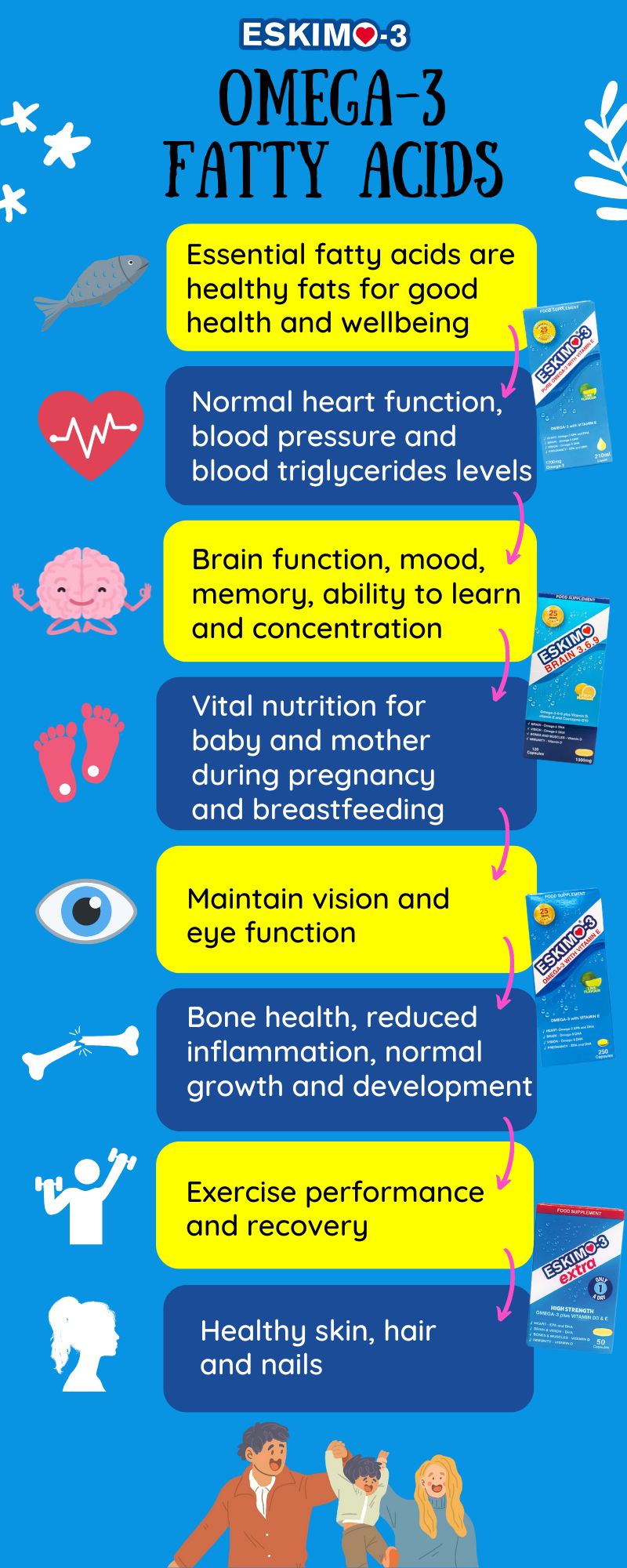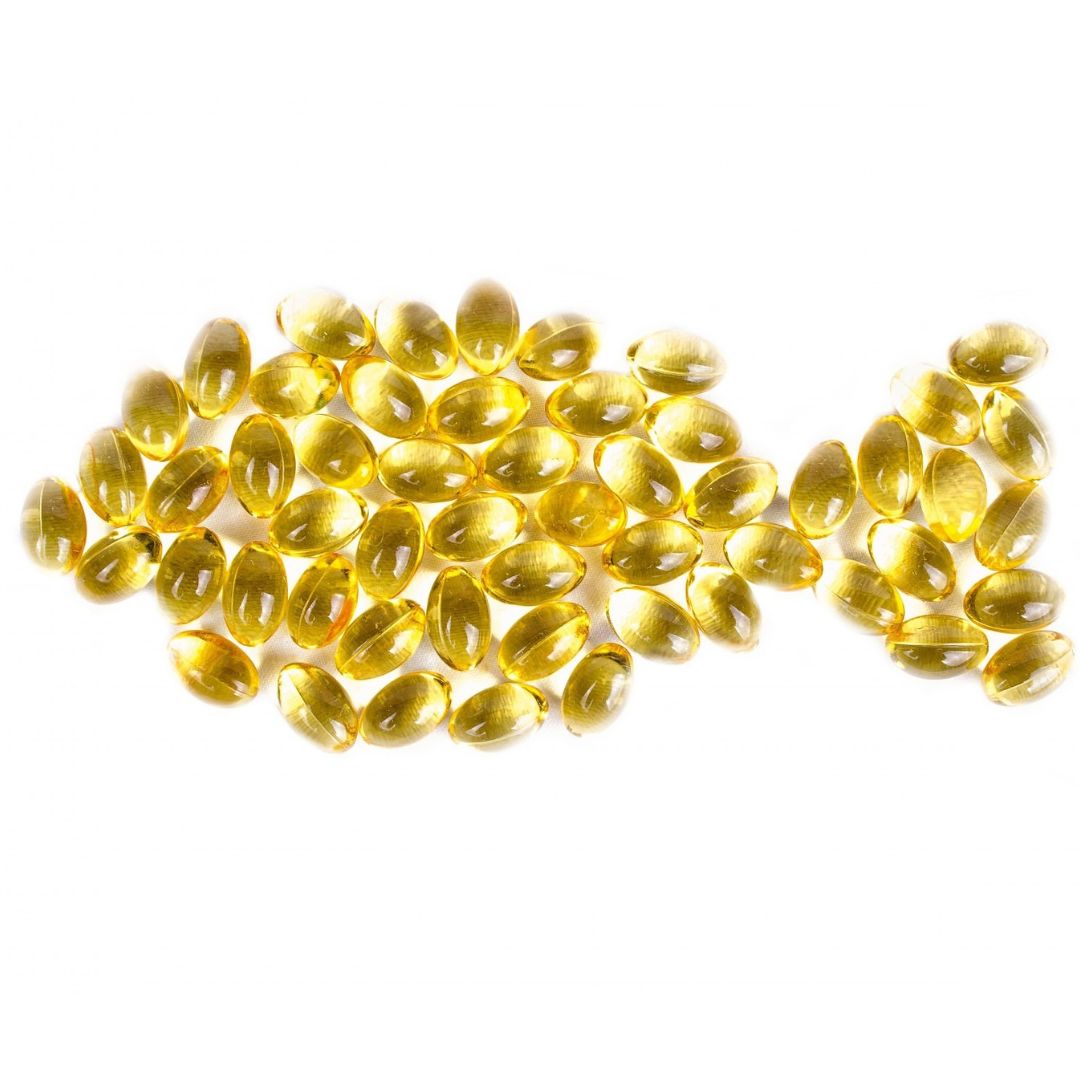Omega-3 Fatty Acids
Omega-3 fatty acids are healthy fats. They are essential fatty acids for good health.
Omega-3 Essential Fatty Acids
Omega-3 fatty acids are essential fatty acids for good health and well-being. There are benefits for cells, bodily functions, heart, brain, vision, mood, energy, and much more. Discover what omega-3 fatty acids are, the types, function, sources, and 21 benefits of these healthy fats.
What are Omega-3 Fatty Acids?
Omega-3 fatty acids are healthy fats. They provide key nutrients that are crucial for our bodies. Omega-3 fatty acids perform vital functions in the body that help all the cells in your body function properly.
Omega-3 fatty acids are a type of polyunsaturated fat. These polyunsaturated fats are dietary fats, which have health benefits.
Both Omega-3 and Omega-6 fatty acids are classified as Essential Fatty Acids. They have to be consumed in our diet, as out bodies cannot produce them.
What are Fatty Acids?
Fatty acids are the building blocks of fats in our bodies. Fats are made up of fatty acids. Fat performs many functions in our bodies. Fatty acids are vital for good health and well-being.
Food Digestion and Nutrients
The digestive system breaks down fats into fatty acids for absorption. After we eat food, our bodies digest food and fat. Digestion is the process of breaking down this food into nutrients, which are absorbed into our bloodstream. Then, the body uses these nutrients for energy to perform bodily functions, for growth and to repair cells.
Types of Omega-3 Fatty Acids – Saturated and Unsaturated Fatty Acids
There are two main types of fatty acids. These are saturated and unsaturated fatty acids.
Saturated fat is a type of dietary fat, which is known as a bad fat. It is an unhealthy fat, if a person consumes too much of it. Both saturated fats and trans fats can increase a person’s cholesterol levels.
Unsaturated fats are considered good fats, due to their health benefits. These unsaturated fatty acids are divided into either monounsaturated or polyunsaturated fatty acids.
Our bodies can produce saturated and monounsaturated fats from carbohydrates, alcohol or protein.
Essential Fatty Acids
Our bodies cannot make certain polyunsaturated fatty acids. These are called Essential Fatty Acids. These essential fatty acids must be consumed through our diet. They are necessary for good health and well-being. Essential Fatty Acids are essential for many bodily functions to perform as required.
Types of Essential Fatty Acids
The are 3 types of omega-3 essential fatty acids. These are DHA, EPA, and ALA.
1. Docosahexaenoic Acid (DHA)
DHA supports brain development, function and memory. It plays an important role in mood and well-being. Docosahexaenoic Acid is vital for vision and eye health.
During pregnancy and breastfeeding, DHA is vital for providing essential nutrition for both the baby and mother’s health.
2. Eicosapentaenoic Acid (EPA)
EPA is important for maintaining a healthy heart. It supports blood circulation and blood vessels, and helps maintain blood sugar levels.
Triglycerides are a type of fat that enters your blood. They come from food and extra calories not used by the body. High levels of triglycerides in the blood can lead to increased risk of heart disease and stroke. EPA reduces triglyceride levels in the blood.
Eicosapentaenoic Acid has anti-inflammatory effects. It contributes to joint mobility and flexibility.
EPA helps our bodies burn fat for a healthy body composition.
3. Alpha-linolenic Acid (ALA)
ALA is required for normal growth and development. Our bodies use ALA for energy. Alpha-linolenic Acid may help decrease the risk of heart disease.
What Do Omega-3 Fatty Acids Do?
Essential Fatty Acids are essential for healthy cell structure and function. Omega-3 fatty acids provide nutrients to help cells throughout our bodies function properly. Theses essential fatty acids are especially important for the brain, eyes and heart.
21 Benefits of Omega-3 Fatty Acids
Are omega-3 fatty acids good for you? Yes, they are essential for good health, and helping cells throughout the body perform vital functions.
The benefits of Omega-3 Fatty Acids include:
- Helps all the cells in body function properly.
- Contributes to energy.
- Supports heart function.
- Reduces triglycerides, which helps reduce the risk of heart disease and stroke.
- Helps reduce blood pressure.
- Contributes to maintenance of balanced blood sugar levels.
- Supports brain function.
- Contributes to memory function and ability to learn.
- Supports concentration.
- Helps balance moods.
- Supports eye function.
- Vital nutrition for baby and mother during pregnancy and breastfeeding.
- Supports foetal brain development.
- Supports foetal eye development.
- Aids joint mobility and flexibility.
- Supports bone function.
- Reduces inflammation.
- Helps exercise performance and recovery.
- Contributes to healthy skin, hair and nails.
- Helps our bodies burn fat for healthy body composition.
- Promotes good health and well-being.

Sources of Omega-3 Fatty Acids
What are the sources of omega-3 fatty acids? Our diet is the source of omega-3 fatty acids. This includes certain foods and dietary supplements.
1. Food
What are the best food sources of omega-3 fatty acids? The best food sources are oily fish, some plant foods, seeds and nuts.
These include:
- Anchovies
- Halibut
- Herring
- Mackerel
- Salmon
- Sardines
- Sturgeon
- Swordfish
- Trout
- Tuna
- Walnuts
- Flaxseeds
- Chia seeds
- Canola oil
2. Omega-3 Supplements
In Ireland, most people do not eat enough fish. Therefore, an Omega-3 supplement is needed to consume adequate levels of essential Omega-3 fatty acids.
Eskimo-3 is Ireland’s number 1 omega-3 supplements brand. We have a range of Omega-3 supplements for all ages to suit your individual and family’s health requirements.
Popular supplements include:
- Eskimo Brain 369 capsules support brain function, vision, and cognitive health in adults and teenagers.
- Eskimo-3 Extra Omega-3 and Vitamin D3 capsules support bone health, muscles, joints, immune system, brain, and heart for active adults, teens and sports enthusiasts.
- Eskimo-3 Omega 3 with Vitamin E support the heart, normal blood pressure, brain, vision, and pregnancy for adults and teenagers.
- Eskimo-3 Kids Chewable DHA+ supports children’s development, brain health, eye sight and immunity for children aged 3 years +.
- Eskimo-3 Kids Omega 3 Liquid support child Development, brain, vision and immune system for kids aged 1 to 12 years old.
How Much Omega-3 Do I Need?
So, how much Omega-3 do I need?
Studies show that people generally need 250mg EPA and DHA per day to support heart health, and 250mg DHA per day to support brain function and vision. A higher does is advised for women who are pregnant or breastfeeding.
Omega-3 Deficiency
What happens if I don’t get enough omega-3s? If you do not consume enough omega-3 fatty acids, you may show signs of omega-3 deficiency.
The signs of low levels of Omega-3 include:
- Low energy levels.
- Skin, nails and hair problems.
- Poor concentration.
- Cardiovascular issues.
- Joint pains.

Questions Omega-3 Fatty Acids
- What are omega-3 fatty acids?
Omega-3 fatty acids are healthy dietary fats. They are Essential Fatty Acids that are vital for good health. Omega-3 fatty acids provide key nutrients for all the cells in our bodies to function properly and perform vital tasks.
- What are the benefits of taking omega-3 fatty acids?The benefits of taking omega-3 fatty acids include:
- Helps all the cells in body function properly.
- Contributes to energy.
- Supports heart function.
- Reduces triglycerides, which helps reduce the risk of heart disease and stroke.
- Helps reduce blood pressure.
- Contributes to maintenance of balanced blood sugar levels.
- Supports brain function.
- Contributes to memory function and ability to learn.
- Supports concentration.
- Helps balance moods.
- Supports eye function.
- Vital nutrition for baby and mother during pregnancy and breastfeeding.
- Supports foetal brain development.
- Supports foetal eye development.
- Aids joint mobility and flexibility.
- Supports bone function.
- Reduces inflammation.
- Helps exercise performance and recovery.
- Contributes to healthy skin, hair and nails.
- Helps our bodies burn fat for healthy body composition.
- Promotes good health and well-being.
- What foods have high omega-3?Food high in omega-3 include oily fish, some plant foods, seeds and nuts. This include Anchovies, Halibut, Herring, Mackerel, Salmon, Sardines, Sturgeon, Swordfish, Trout, Tuna, Walnuts, Flaxseeds, Chia seeds, and Canola oil.

